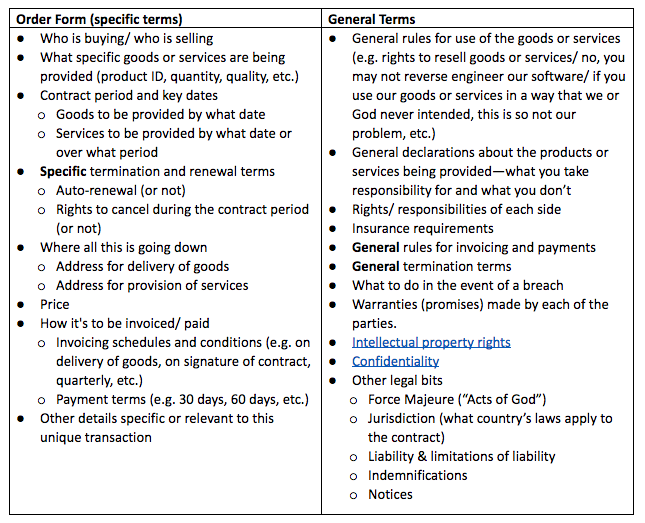The Best Offense is a Good Defense: Sales Contract Templates
17.06.2020

Recently, a friend dropped me a line. His start-up is about to start to sell products, which is great! But this means that they need to draft a sales contract, and they didn’t know where to start. Did I have any suggestions for them?
Of course I do!
In a nutshell: modular sales contract forms.
First, some basics
Let’s talk about what a sales contract includes.
- Order form (specific terms): information about this transaction in particular.
- General terms: information about sales transactions and/or sales of this type of product or service in general.
That’s it, really. If you flesh it out a bit, it looks a bit like this.

The above breakout isn’t exhaustive (there’s much more where that came from) and it’s not written in stone. First, your specific and general terms will vary based on what you are selling. For example, if you are selling services based on personal data in the EU, your general terms will need to include a section on each side’s privacy and data protection obligations under GDPR. In addition, certain terms might have specific and general incarnations. A good example of this would be cancellation rights. Most contracts that you will sign off on, as a seller or a buyer, will include a standard, general term that either side can cancel the contract if the other side is in breach (that is, they aren’t doing what they are supposed to be doing under the contract), if the other side declares bankruptcy, if required to by law and under similar types of circumstances. At the same time, an order form might include a specific term that the buyer has the right to cancel the contract after a certain amount of time. For example, in a two year service contract, the buyer might be given the right—negotiated as part of that particular contract—to cancel the contract after the first year. In addition, where changes to the general terms are negotiated as part of a contract, this will often appear as an additional specific term in the order form.
Right….so how do we turn all this into a user-friendly tool that your sales team can use but not mess up?
Breaking it down
A lot of companies use sales contracts where the terms are in the body of the document; you just need to insert the terms for the particular transactions and you are good to go. So long as everyone always uses a nice, fresh template for each sale, you won’t run into cases where you are sending Company B a contract with Company A’s payment terms or where random chunks of your general terms have mysteriously been deleted.
Sadly, unless you are using a contract creation software (which you probably aren’t at a small company) the chances of everyone always using a nice, fresh template for each sale are pretty slim. One way to minimize the potential for contract bloopers is the (1) group all the specific terms together, where they are easy to check and (2) keep your sales team’s grubby little hands (or keyboards, as the case may be) off of your general terms. That is (and as discussed here) you break your contract into two sections.
Your sales team just needs to fill out the order form and send that to the client with a copy of the general terms. And voila! A contract!
Order Form (specific terms) –Salespeople can touch this
I prefer using forms and tables for these as opposed to a narrative as it’s easier both for the salesperson to see what needs to be completed and for your finance department or other reviewer to check the contract before sending it out to the client. For example, your sales team manager may review all contracts prior to sending to make sure that the sales person isn’t offering to sell things that your company can’t actually provide (happens!) and that other details (e.g. terms or unit prices) are correct. A simple format also makes it easier for your clients to review and confirm that “yes, this is what we want to buy and these are the terms we agreed to”.
A particularly critical area is the section in which you discuss what is being sold; nothing can sour a commercial relationship quite like your client expecting to get A where you think you are to provide them with B. If your goods and services are standard, you may be able to get away with a simple list format in which the desired goods or services are checked off. If your goods or services have more bespoke elements (for example, you sell enterprise software and customize it for each user) you’ll need to include space in the order form for more detailed descriptions. For example, you might have a section in the order form entitled “report description”. Alternatively, you might set up standard annexes which can be added to an order form which cover the various types of detailed information that you might need to collect; salespeople can select and incorporate annexes they need based on what is being sold.
The key thing here is standardization. Set standard rules for how salespeople collect and document supporting contract data. If every piece of information has a fixed place in the order form template, it’s easier for your salesperson to complete and for reviewers to check. And ultimately, it means better service, as everyone will be clear as to what is to be provided.
Your overall goal is to ensure that the description is clear and detailed enough that the your client is clear on what they are getting, you are clear on what you are to provide, that these are in agreement and you don’t run into a situation where a client terminates a contract or refuses to pay because the product or service doesn’t do what they thought it would.
Combining the Specific and the General Terms
When a client is signing off on an order form, you’ll want to make sure that they know that their use of the goods or services are subject to general terms as well. In order to do this at my company, we have the signature field as part of the specific terms and, above the signature (so it it’s super clear) there’s a series of declarations.
- Whomever is signing is legally allowed to sign off on behalf of their company.
- The person signing knows that the contract that they are signing includes the order form and also the general terms.
- In the event of a conflict between the order form and the general terms, that the order form will prevail (that is, you follow what the order form says, and not the general terms). This is going to be relevant if a client asks for a change to the general terms and this is written down in the order form.
- That the order form and the general terms include all of the contract terms. If your salesperson told a client verbally that they would also receive flowers on their birthday as part of the deal, but that’s not written down in the contract –then no flowers!
General terms pointers
My advice here is the same as my advice for employment contracts, non-disclosure agreements and inventions assignment agreements: go to your legal counsel and have them draft a set of clear, fair T&C's that covers—as much as possible—all of your products and services. If one set won’t cover everything or if combining terms for multiple products will result in a set of monster terms 20 pages long and endless questions from clients (e.g. “why do the general terms talk about software issues if we are buying consulting services”) have them do a few different versions (e.g. one for software sales and one for consulting services) Seriously. Do it once, do it right and then don’t let your salespeople muss it up.
As always, the rule of thumb here is garbage in, garbage out. If you want to receive a solid set of terms that will protect your company, your legal counsel will need to know what is being protected. This means you need to make sure that they know what you are selling/ to what types of clients/ where these clients are/ what you need to protect/ any special risk factors and so on.
One point of contract strategy to keep in mind when setting up your terms: don't be a jerk. You want to balance your genuine need to protect your company against risk (e.g. reverse engineering, folks poaching your employees, misuse of your products, etc.) with the desire to get one over on the other side. Draconian or clearly one-sided and unfair terms in your contract will often result in the other side’s legal counsel (or CFO) coming back to you with a laundry list of points. When I get a certified jerk contract, I immediately get suspicious and will put twice as much time reviewing every last line, looking for all the ways this jerk is trying to screw my company. I have checked with Adrian Daniels, who is a real lawyer about this. He told me that has a similar reaction and noted that doesn't mean he won't review the "fairer" contract properly, but the difference is when he sees a very one-sided contract, he tends to review the contact more critically and he may mark up comments that he would otherwise let go, if the contract had looked fairer. In short, you want to aim for balance. A fair contract on the one hand, but on the other, do think about what could hurt you (reverse engineering/ theft/ etc.) and make sure your contract addresses it.
An exception to the rule
One exception to all of the above are sales to larger companies. While you may be able to use your own order form for the specific terms, larger companies will often have their own set of standard general terms for purchase transactions and you’ll need to sign off on these if you want to sell to them. These general terms will often include items which a smaller company might set on a contract by contract basis and will often go into far greater detail as to what they expect from you as a supplier. For example, larger companies will often require that all their purchase contracts have more generous cancellation rights or payment terms (more generous for them, that is—for you these will almost invariably suck ☹). You’ll want to review their terms carefully. See this article for some pointers; the same general concepts that apply to reviewing third-party contracts in which you are buying will apply to reviewing third-party contracts in which you are selling.
In this case, the signature field in your order form can be amended so that instead of referencing your company’s general terms, you’ll note that the contract is subject to Behemoth Company T&C’s, attached as Annex A…or something like that.
My thanks to Adrian Daniels of Yigal Arnon for his assistance with this article!
Gila Halleli Weiss, Accountant and advisor to startups with 21 years’ experience. A dual-certified CPA (Israel & the US). In addition to serving as CFO of mySupermarket I serve as an advisor to startups via my website, CFO Secrets , as an outsource CFO for an early-stage startup and as a mentor and lecturer for MassChallenge.











